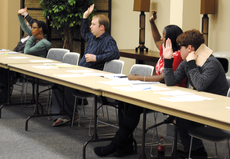Students discussed a variety of campus issues including a new recreation center fee, the University’s smoking policy and residents’ Internet connections Thursday night during the Student Government Association’s second town hall meeting. Brittany Taraba, SGA vice-president, discussed plans to have students vote on an operational fee for the recreation center. The fee, which would cap at $78 per semester, is meant to cover all expenses related to running the center, including the payment of more than 25 student jobs, and it would not be assessed until the center is opened to students.
Voting on the fee will be held during spring elections in April. Taraba said the SGA will offer informational sessions in March regarding the fee so students can be better educated on the matter before voting.
Students also discussed the University’s smoking policy, which currently states no one can smoke within 25 feet of a building’s entrance or on walkways, and how the policy should be enforced. Taraba said the ash trays located near building entrances send the wrong message to smokers and that the SGA is interested in enforcing the policy while giving smokers more designated areas to smoke.
Ryan Donegan, SGA president, said the SGA likes the current policy and would like to see more enforcement but does not want the campus to become smoke-free.
Eugene Dial, vice president for student affairs and enrollment services, said it is not just a smoking issue but also a litter issue. “There’s no single, finite solution everyone will agree with,” Dial said.
Several campus residents said they have issues with the slow speed of the University’s Internet connection. Donegan said part of the problem is due to most students logging on around the same time after classes.
Whitney Dupuy, director of student rights and grievances, said another reason for the slow connection is residents playing online video games for several hours each night.
Some students suggested increasing rent to pay for more online servers, but other students said they should not have to pay extra for quicker Internet access when they are not causing the problem. One student suggested allowing residents to purchase access to a quicker server on an individual basis.
Other topics discussed at the meeting included increasing the number of free pages students are allowed to print as part of the printing policy, providing storage space for student organizations, availability of parking spaces on campus, food options in the Student Union and the increasing price of textbooks.
Students also discussed the image and productivity of the SGA and ways to get students more involved. Donegan said the SGA would consider holding its next town hall meeting earlier in the day to encourage more students to voice their concerns. Several senators urged students to get involved, communicate more openly with the SGA and attend the senate meetings, which are held at 4 p.m. on Mondays in the Plantation Suite of the Bollinger Memorial Student Union.
Donegan said the SGA does not want to waste its time on issues that students are not concerned with.
“Our concerns are your concerns,” Donegan said.








